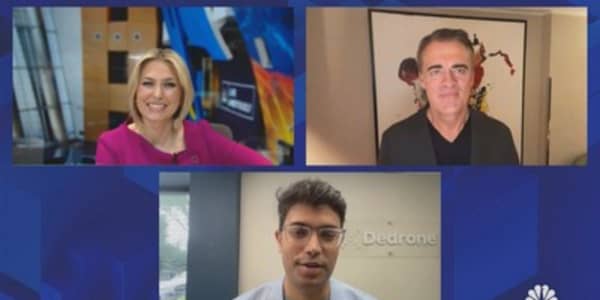"Skorverdon zaldrīzoti Daenerys ēza?"
Translation: How many dragons does Daenerys have? It's not a ridiculous question if you're a fan of the HBO hit series "Game of Thrones," which returns for its eighth and final season on Sunday. The language? It's called High Valyrian, the tongue of the ruined Valyrian Freehold empire, and it's one of four languages created by linguist David J. Peterson spoken on the show.
While only one character can speak native High Valyrian on "Game of Thrones," viewers nationwide are picking up a few words and phrases from an unlikely source: Duolingo, the free language-learning app.
Duolingo first offered lessons in High Valyrian in 2017 and, since then, 1.2 million people have started the course. In the last two weeks leading up to the premier of the final season, Duolingo has seen a near 65% increase in people taking the course, said Sam Dalsimer, a spokesman for Duolingo.
High Valyrian isn't the only fictional language Duolingo has to offer. Star Trek fans can find Klingon, a language constructed by Marc Okrand and centered around spacecraft, warfare and weaponry.
To offer languages on Duolingo, the company usually relies on hundreds of volunteers and employees to develop course material and monitor users' experiences. That's not the case when it comes to High Valyrian, where Peterson is a contributor and develops the courses for free.
"We teach over 30 languages and most have thousands of people who speak them and are capable of helping us teach them." Dalsimer said. "There's only one person on planet Earth who knows the language, and that's David Peterson."
The origins of High Valyrian come from the book that inspired the show, written by George R.R. Martin. Peterson won a contest to develop the more common language used on "Game of Thrones" called Dothraki but was asked to build High Valyrian later in the series. His goal was to create a classic language that could give birth to many others, similar to Romance languages, and Peterson noted it had to fit with the names Martin created for the book, such as Daenerys, Viserys and Rhaella.
There are now 824 words of High Valyrian that users can learn on Duolingo, and that number continues to grow. Peterson said there are now 2,000 words in the full version of the language he maintains.
"With every single language I create I keep working on it for the rest of my life or until I'm not happy with it," said Peterson, who has created more than 50 languages. "It will basically just be another one of my languages, it's not like it's going to get any special treatment."
When Peterson first encountered Duolingo, he felt it could revolutionize the way people learned languages. It had a great interface, it was free and, as a linguist, it's the dream for people like him to create languages people would have access to, although he didn't foresee how popular High Valyrian would become.
Today, High Valyrian has 822,000 active learners, or those who have used the course in the last 12 months. That's more than Czech, Norwegian, Vietnamese and Hungarian.
"I imagined it would attract casual interest, but I never imagined there would be that many people who would actually be interested in taking the course," Peterson said.
There is one statistic Peterson is particularly proud of: 44% of users who came to Duolingo to learn High Valyrian went on to practice other languages. While users may not perfect High Valyrian, Peterson sees the language as a "gateway drug" to learners discovering other cultures.
"As we become more economically focused, people view language as a tool as opposed to an art piece in and of itself or cultural history," Peterson said.
More than 40% of the world speaks one of eight languages, although there are more than 7,000 worldwide. UNESCO, The United Nations Educational, Scientific and Cultural Organization, has labeled 2,680 languages in danger as it celebrates the International Year of Indigenous Languages, designed to raise awareness to disappearing languages.
"It's nice that the UN is putting this emphasis on indigenous languages because people need to start addressing this issue," Peterson said. "We're losing them and we're losing them quickly, and once they're lost, they're lost."
Duolingo has worked with communities and volunteers like Peterson to develop courses in endangered languages, such as offering lessons in Hawaiian, Irish and Navajo, Dalsimer said.
"Those courses are driven entirely by volunteer contributors and for them it's more about a desire to preserve their language and their culture because they see it as being endangered, and it is," Dalsimer said. "Languages die every year and Duolingo can help them preserve it."
More from CNBC Disruptor 50:
Uber releases its long awaited IPO filing
Apple slams Spotify's claims about App Store
"I remember thinking that if David Peterson ever taught the 'Game of Thrones' language I would definitely check it out," said Andrew Feinberg, a volunteer for Duolingo who has used the app since its beta version nearly seven years ago.
Except when Duolingo announced it would offer High Valyrian courses, Feinberg thought it was a joke. He helped Duolingo develop its Norwegian and Japanese platforms, and he's witnessed the company's pranks in the past, like when it offered pirate and zombie languages.
But Feinberg noticed the only contributor to the course was Peterson. That's when he realized it wasn't a joke.
Peterson, dubbed by the Los Angeles Times as "Hollywood's go-to language guy" has created languages for many film and television projects, including the movies "Thor: The Dark World" and "Doctor Strange."
"I had sort of stalked him on YouTube and watched all those videos on how he created those languages," Feinberg said. "I was really excited for it. I knew that he was a serious linguist who had complimented Duolingo before."
Now Feinberg manages learning groups on Facebook for Japanese, Chinese, Norwegian and, a day after its introduction, High Valyrian, which has amassed over 200 members learning alongside Peterson himself, who encourages people to use and develop the language in conversation with each other even if that means moving beyond what he imagined.
"It's always a little different since I did create High Valyrian and, in a sense, there is an arbiter to determine what is right and what is wrong," Peterson said. "But as long as I'm here I feel like not only do I want to, but I should be there to try to help people out."







